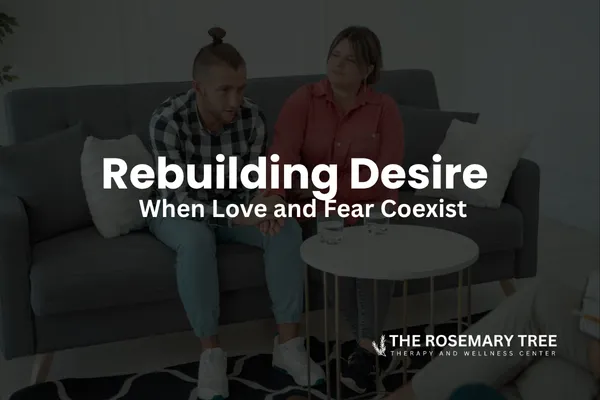
Rebuilding Desire: When Love and Fear Coexist
When Desire Feels Out of Reach
After betrayal, many couples reach a stage where things feel calmer and safer, yet intimacy still feels distant. You may love each other deeply but struggle to feel desire, comfort, or closeness.
This can be painful and confusing. One or both partners might wonder, “What’s wrong with me?” or “Why can’t we just feel normal again?”
But there is nothing wrong with you. What you are feeling is part of the healing process. Desire cannot exist where fear still lives, and after betrayal, love and fear often coexist for a while.
Why Desire Disappears After Betrayal
Betrayal impacts both the emotional and physical connection between partners. The same brain chemicals that once created attraction and bonding are disrupted by the trauma response.
Your body may still be in a state of protection, interpreting closeness as a potential threat. The nervous system can’t access desire when it’s working to keep you safe.
That’s why, as we explored in Navigating Triggers During Intimacy, emotional readiness always comes before physical reconnection. Desire begins to return naturally once your body feels calm, your emotions feel safe, and your trust feels steady.
Love and Fear Can Exist Together
Many couples believe they have to completely “get over” fear before intimacy can return. The truth is, fear and love often live side by side during recovery.
You can still love your partner while feeling cautious. You can want closeness and still hesitate. Healing happens when both people can hold that tension with compassion instead of pressure.
It’s not about eliminating fear, it’s about learning to move gently with it.
Steps to Begin Rebuilding Desire
Return to Emotional Safety
Revisit the emotional connection practices from The Role of Emotional Intimacy in Physical Reconnection. Check in daily, speak openly about how you feel, and respond to each other with care. Emotional closeness is the doorway to physical connection.Redefine Intimacy Together
Intimacy is not only about physical touch. It can mean shared laughter, long conversations, or simply resting near each other without pressure. Redefining intimacy creates freedom instead of fear.Create Safe Opportunities for Connection
Plan intentional, pressure-free moments of closeness. This might be a quiet dinner, a shared walk, or gentle touch that doesn’t lead anywhere. Allow desire to reappear on its own timeline.Communicate Needs and Boundaries
It’s okay to say what you need or what feels too soon. Clarity builds safety. When both partners know they can speak honestly, connection becomes natural again.Acknowledge Small Progress
Every smile, touch, or moment of ease is a sign that healing is happening. Celebrate progress without rushing the outcome.
How the Body Relearns Desire
Desire is not only emotional — it’s biological. When the nervous system begins to trust again, it starts releasing oxytocin and dopamine, the hormones that help you feel closeness and joy.
This is why emotional safety is so important. Without it, the body stays tense and guarded. Once calm returns, affection feels possible again, and intimacy begins to flow naturally.
How Accelerated Outcomes Therapy Supports This Stage
For couples who have stabilized emotionally but feel disconnected physically or romantically, our Accelerated Outcomes Therapy Intensives offer a structured path forward.
These intensives are designed for couples who say things like:
“We’ve healed from the affair, but we can’t reconnect.”
“We love each other, but it still feels like there’s distance.”
“We want to feel close again without forcing it.”
During these focused sessions, you and your partner can:
Identify the fears and beliefs blocking intimacy
Practice new ways to communicate comfort and desire
Rebuild trust through guided emotional and physical connection
Learn how to reintroduce touch safely and respectfully
Many couples describe these intensives as the turning point where they finally begin to feel like a team again.
When Desire Feels Forced or Missing
If intimacy feels pressured or empty, that doesn’t mean your relationship is broken. It simply means more healing is needed before desire can safely return.
Trying to force connection can create new pain. Choosing patience allows both hearts and bodies to align naturally.
Desire is not something you perform. It’s something that returns when both partners feel safe enough to open again.
Final Thoughts
Rebuilding desire after betrayal is not about going back to what you had before. It’s about creating a new kind of closeness, one that feels safe, honest, and deeply connected.
Fear does not mean love is gone. It means your body is still learning to trust that love again. With compassion, time, and the right support, that spark can return stronger than before.
If you are ready to begin this stage of healing, we would love to help. You can reach out to us here, and our team will connect with you to talk about what this process could look like. There is no pressure, only care and space for your relationship to rediscover its warmth again.


